最新中考英语易混词汇辨析
- 格式:pdf
- 大小:431.42 KB
- 文档页数:27
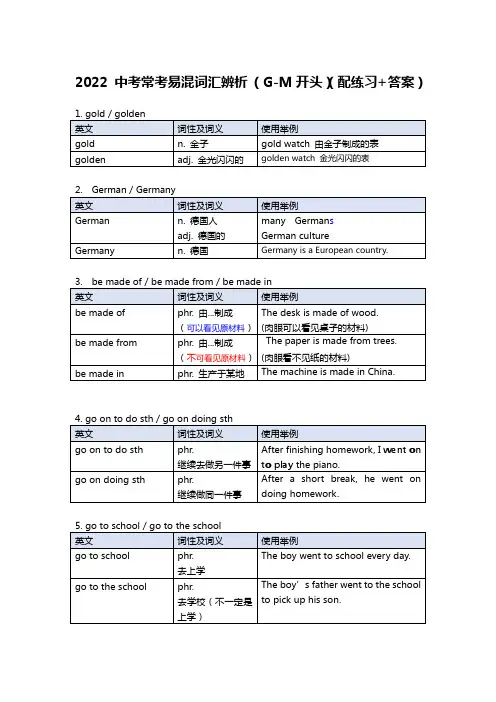
2022 中考常考易混词汇辨析(G-M开头)(配练习+答案)9. jeans/ trousers / pants/ shoes 等成双成对的词的主谓一致问题10. 【参加】的词组Practice1. The sun is shining. Don't look at the sun.A.gold; straightB.golden; straightlyC.golden; straightD.gold; straightly2. —Do you come from ?—No. But I can speak well.A.Germany; GermanB.German; GermanyC.Germany; GermanyD.German; German3. Students will make progress if they a subject.A.be made ofB.be made fromC.be made up ofD.be made in4. The kite is paper, and the paper is trees.A.made of; made fromB.made from; made ofC.made of; made inD.made from; made in5. It's getting dark, let's , shall we?A.go on to workB.go on workingC.to go on workD.to go on working6. Students to study. Their parents to pick them up.A.go to the school; go to the schoolB.go to school; go to schoolC.go to the school; go to schoolD.go to school; go to the school7. Boys and girls, time is up, please check your name and your papers.A.hand outB.hand upC.hand inD.hand down8. The hunter the fox, took off its skin and it on the tree.A.hung; hangedB.hung; hungC.hanged; hangedD.hanged; hung9. Our teacher often tells us different events that have strong influence on China.A.historic; historyB.historical; historicC.history; historyD.history; historic10. In order to have a better understanding of those places of interest, she read some books before the visit.A.historical; historicalB.historical; historicC.historic; historicalD.historic; historic11. Why don't you us to the speech contest?A.join; joinB.take part in; take part inC.take part in; joinD.join; take part in12. A is a long journey on a ship or in a spacecraft.A.tourB.voyageC.tripD.continent13. The boy's mother is . He has to look after his mother at home.A.bad; sickB.ill; badC.ill; sickD.sick; ill14. This year's Government Work Report many issues economic growth, environmental protection, etc.A.includes; includingB.include; includingC.is included; includeD.including; include15. Thousands of people lost their in the earthquake, so we should value our daily .A.lives; lifeB.life; lifeC.lives; livesD.life; lives16. Independence does not mean (shut)the door to the world.本章答案1-5 BACAB 6-10 DCDDC 11-15 DBCAA 16. shutting。
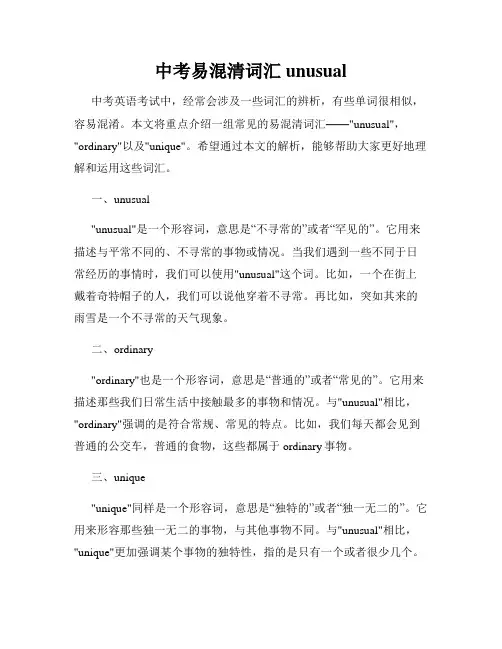
中考易混清词汇unusual中考英语考试中,经常会涉及一些词汇的辨析,有些单词很相似,容易混淆。
本文将重点介绍一组常见的易混清词汇——"unusual","ordinary"以及"unique"。
希望通过本文的解析,能够帮助大家更好地理解和运用这些词汇。
一、unusual"unusual"是一个形容词,意思是“不寻常的”或者“罕见的”。
它用来描述与平常不同的、不寻常的事物或情况。
当我们遇到一些不同于日常经历的事情时,我们可以使用"unusual"这个词。
比如,一个在街上戴着奇特帽子的人,我们可以说他穿着不寻常。
再比如,突如其来的雨雪是一个不寻常的天气现象。
二、ordinary"ordinary"也是一个形容词,意思是“普通的”或者“常见的”。
它用来描述那些我们日常生活中接触最多的事物和情况。
与"unusual"相比,"ordinary"强调的是符合常规、常见的特点。
比如,我们每天都会见到普通的公交车,普通的食物,这些都属于ordinary事物。
三、unique"unique"同样是一个形容词,意思是“独特的”或者“独一无二的”。
它用来形容那些独一无二的事物,与其他事物不同。
与"unusual"相比,"unique"更加强调某个事物的独特性,指的是只有一个或者很少几个。
比如,著名画家达·芬奇的画作就是unique的,因为没有人能够完全复制他的作品。
在使用这些词汇的时候,我们需要注意它们的搭配和用法。
比如,我们可以说一个人的外表很unusual,但不可以说他很unique,因为unique的意思是"独一无二的",用来形容事物而不是人。
另外,我们可以说一个事物是ordinary和unusual的,但不可以说它是ordinary和unique的,因为这两个词意思相对矛盾。
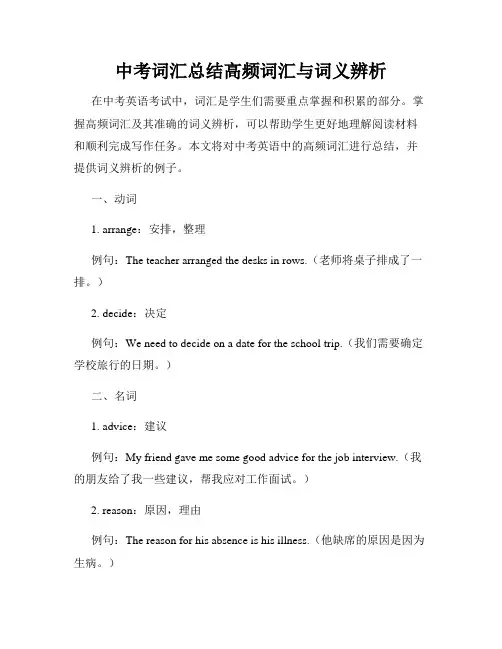
中考词汇总结高频词汇与词义辨析在中考英语考试中,词汇是学生们需要重点掌握和积累的部分。
掌握高频词汇及其准确的词义辨析,可以帮助学生更好地理解阅读材料和顺利完成写作任务。
本文将对中考英语中的高频词汇进行总结,并提供词义辨析的例子。
一、动词1. arrange:安排,整理例句:The teacher arranged the desks in rows.(老师将桌子排成了一排。
)2. decide:决定例句:We need to decide on a date for the school trip.(我们需要确定学校旅行的日期。
)二、名词1. advice:建议例句:My friend gave me some good advice for the job interview.(我的朋友给了我一些建议,帮我应对工作面试。
)2. reason:原因,理由例句:The reason for his absence is his illness.(他缺席的原因是因为生病。
)三、形容词1. polite:有礼貌的例句:Emily is always polite to her elders.(艾米莉对长辈总是非常有礼貌。
)2. honest:诚实的例句:He is an honest person and never tells lies.(他是一个诚实的人,从不说谎。
)四、副词1. quickly:快速地例句:She finished the race quickly and won the first place.(她迅速完成了比赛并获得了第一名。
)2. quietly:安静地例句:Please read quietly in the library.(请在图书馆安静地阅读。
)词义辨析:1. forget与remember虽然forget和remember都有“记住”的意思,但用法上有所不同。
forget表示“忘记”,后接名词或动名词,而remember表示“记得”,后接名词、动名词、动词-ing形式或从句。

中考词汇辨析§1 a bit/ a little这两个词都意为“一点儿”有时可以互换,但有时不能.Ⅰ.二者作程度副词修饰形容词、副词、动词或比较级时,意义相同,为“一点儿”“有些"。
如:①I am a bit / a little hungry. 我有点饿。
②He walked a bit / a little slowly。
他走路有点慢.Ⅱ.二者都可以作名词词组,充当主语或宾语。
如:①A little / bit is enough for me. 我有一点儿就够了。
②I know only a little / a bit about her. 我对她的情况只了解一点。
Ⅲ。
a little可直接修饰名词;a bit后须加of才可以。
如:①.There is a little water in the bottle. = There is a bit of water in the bottle.[注意] a little of后的名词通常特指,表“……中的一些",如:①May I have a little of your tea?Ⅳ。
否定形式not a little 作状语,相当于very/ quite,“很”,“非常”;作定语和宾语时,相当于much,意为“许多"。
而not a bit 作状语时,相当于not at all,意为“一点也不”,作宾语时则相当于not much. Eg:①He is not a little (=very)hungry. 他饿极了。
②He is not a bit(=not at all) hungry.他一点也不饿。
③She ate not a little(=much)。
她吃得很多。
Ⅴ. Not a bit中的not 可以分开使用;not a littl e中的not 则不能分开。
Eg:①He felt not a bit tired. = He didn’t feel a bit tired. 他觉得一点也不累。
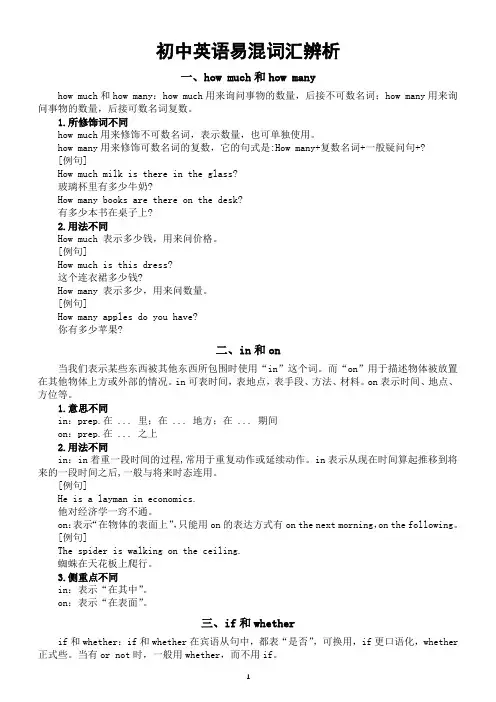
初中英语易混词汇辨析一、how much和how manyhow much和how many:how much用来询问事物的数量,后接不可数名词;how many用来询问事物的数量,后接可数名词复数。
1.所修饰词不同how much用来修饰不可数名词,表示数量,也可单独使用。
how many用来修饰可数名词的复数,它的句式是:How many+复数名词+一般疑问句+?[例句]How much milk is there in the glass?玻璃杯里有多少牛奶?How many books are there on the desk?有多少本书在桌子上?2.用法不同How much 表示多少钱,用来问价格。
[例句]How much is this dress?这个连衣裙多少钱?How many 表示多少,用来问数量。
[例句]How many apples do you have?你有多少苹果?二、in和on当我们表示某些东西被其他东西所包围时使用“in”这个词。
而“on”用于描述物体被放置在其他物体上方或外部的情况。
in可表时间,表地点,表手段、方法、材料。
on表示时间、地点、方位等。
1.意思不同in:prep.在 ... 里;在 ... 地方;在 ... 期间on:prep.在 ... 之上2.用法不同in:in着重一段时间的过程,常用于重复动作或延续动作。
in表示从现在时间算起推移到将来的一段时间之后,一般与将来时态连用。
[例句]He is a layman in economics.他对经济学一窍不通。
on:表示“在物体的表面上”,只能用on的表达方式有on the next morning,on the following。
[例句]The spider is walking on the ceiling.蜘蛛在天花板上爬行。
3.侧重点不同in:表示“在其中”。
on:表示“在表面”。
三、if和whetherif和whether:if和whether在宾语从句中,都表“是否”,可换用,if更口语化,whether 正式些。
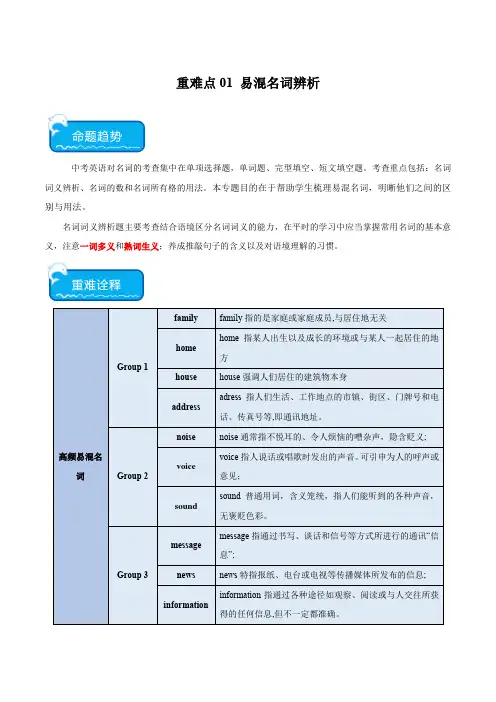
重难点01 易混名词辨析中考英语对名词的考查集中在单项选择题,单词题、完型填空、短文填空题。
考查重点包括:名词词义辨析、名词的数和名词所有格的用法。
本专题目的在于帮助学生梳理易混名词,明晰他们之间的区别与用法。
名词词义辨析题主要考查结合语境区分名词词义的能力,在平时的学习中应当掌握常用名词的基本意义,注意一词多义和熟词生义;养成推敲句子的含义以及对语境理解的习惯。
(2023中考真题建议用时:15分钟)1.(2023·辽宁鞍山·中考真题)—Why does Mary get good grades each time?—I think that’s because she puts most of her ________ into her schoolwork.A.energy B.practice C.exercise D.process2.(2023·内蒙古·中考真题)—The model plane is wonderful! How did you make it?—It’s easy. Follow the ________ and you can do it, too.A.discussion B.education C.conditions D.instructions3.(2023·江苏淮安·中考真题)As a student, you should keep a ________ between your schoolwork and yourhobbies.A.diary B.record C.secret D.balance4.(2023·湖北襄阳·中考真题)—Mr. Fan runs at least half an hour every day.—What a good ________! No wonder he looks healthy.A.habit B.question C.article D.prediction5.(2023·湖北黄石·中考真题)—Could you tell me the ________ of making such tasty dumplings?—Well, I just follow the steps on Tiktok.A.cost B.method C.time D.menu6.(2023·内蒙古呼和浩特·中考真题)High-speed trains are seen as one of the new Four Great ________ of China.A.Inventions B.Advantages C.Environments D.Technologies7.(2023·江苏常州·中考真题)After she was brought back to China, the sick giant panda Ya Ya received good ________ in her new home and got better.A.education B.communication C.entertainment D.treatment8.(2023·江苏南通·中考真题)—________ are easily made, but not easily kept.—That’s true. Once you make one, be sure to keep it.A.Speeches B.Decisions C.Promises D.Suggestions9.(2023·江苏镇江·中考真题)The main ________ of the cities along the Grand Canal (大运河) is history and culture.A.attraction B.pollution C.invention D.situation10.(2023·青海·中考真题)A taxi driver prevented (阻止) an _________ when he saw a car with serious problems travelling across Huangnan.A.accident B.interview C.advertisement11.(2023·山东青岛·中考真题)Before flying a plane, a ________ must take a lot of training.A.policeman B.musician C.nurse D.pilot12.(2023·湖北十堰·中考真题)—How did you fix up the machine, dad?—It’s easy. I just followed the ________.A.instructions B.inventions C.interviews D.influences13.(2023·江苏徐州·中考真题)Of all the ________, I love summer best.A.seasons B.subjects C.colours D.hobbies14.(2023·辽宁丹东·中考真题)Mary’s parents are interested in ________, so they often take her to concerts.A.sports B.music C.science D.movies15.(2023·江苏宿迁·中考真题)—The girl’s beautiful pronunciation caught our ________ in yesterday’s English speech competition.—Yes, many students couldn’t help cheering for her.A.condition B.attention C.invention D.position16.(2023·江苏泰州·中考真题)—Good news! The Chinese women table tennis team won a gold and a silver again.—Great! No matter who wins the medals, it is the ________ of our country.A.price B.pioneer C.pride D.pain17.(2023·黑龙江牡丹江·中考真题)Although our school life is a little busy, it is full of ________.A.pain B.sadness C.laughter18.(2023·四川遂宁·中考真题)—Which movie would you like to watch, Tracy?— Um…it’s hard to make a ________.A.survey B.choice C.call D.wish19.(2023·辽宁·中考真题)Thanks to the teacher’s help, I solved all the ________ easily.A.chances B.problems C.habits D.grades20.(2023·辽宁营口·中考真题)Scientists who are full of ________ always come up with new ideas and bring great changes to our life.A.instruction B.instrument C.invention D.introduction1.A【详解】句意:——为什么玛丽每次都取得好成绩?——我想那是因为她把大部分精力都放在功课上了。
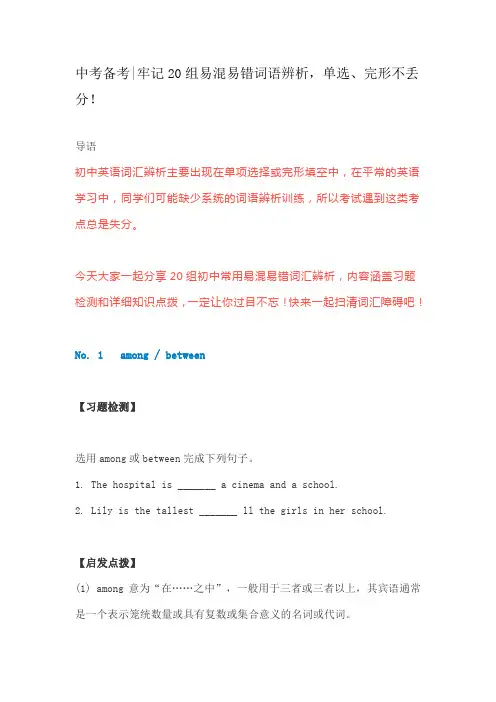
中考备考|牢记20组易混易错词语辨析,单选、完形不丢分!导语初中英语词汇辨析主要出现在单项选择或完形填空中,在平常的英语学习中,同学们可能缺少系统的词语辨析训练,所以考试遇到这类考点总是失分。
今天大家一起分享20组初中常用易混易错词汇辨析,内容涵盖习题检测和详细知识点拨,一定让你过目不忘!快来一起扫清词汇障碍吧!No. 1 among / between【习题检测】选用among或between完成下列句子。
1. The hospital is _______ a cinema and a school.2. Lily is the tallest _______ ll the girls in her school.【启发点拨】(1) among意为“在……之中”,一般用于三者或三者以上,其宾语通常是一个表示笼统数量或具有复数或集合意义的名词或代词。
(2) between一般指两者之间,其宾语通常是表示两者概念的名词或代词,或由and连接的两个具体的人或物。
between有时也可表示多者之中的“两两之间”。
如:Switzerland lies between France, Germany, Austria and Italy.Key:1. between2. amongNo. 2 lay / lie【习题检测】用lay或lie的适当形式完成句子。
1. I _______ the table when my mother cooked the meal.2. John was ill and _______ in bed all morning.【启发点拨】(1) lay作动词,可意为“摆放(餐桌)”,其过去式与过去分词均为laid,现在分词为laying,常用于短语lay the table,意为“摆放餐桌”。
如:Tom was laying the table.(2) lie作动词,意为“躺;平躺”时,过去式为lay,过去分词为lain,现在分词为lying。
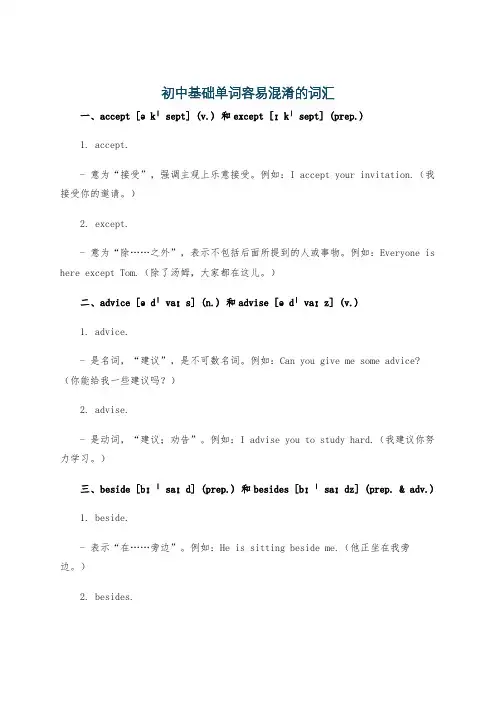
初中基础单词容易混淆的词汇一、accept [əkˈsept] (v.) 和except [ɪkˈsept] (prep.)1. accept.- 意为“接受”,强调主观上乐意接受。
例如:I accept your invitation.(我接受你的邀请。
)2. except.- 意为“除……之外”,表示不包括后面所提到的人或事物。
例如:Everyone is here except Tom.(除了汤姆,大家都在这儿。
)二、advice [ədˈvaɪs] (n.) 和advise [ədˈvaɪz] (v.)1. advice.- 是名词,“建议”,是不可数名词。
例如:Can you give me some advice?(你能给我一些建议吗?)2. advise.- 是动词,“建议;劝告”。
例如:I advise you to study hard.(我建议你努力学习。
)三、beside [bɪˈsaɪd] (prep.) 和besides [bɪˈsaɪdz] (prep. & adv.)1. beside.- 表示“在……旁边”。
例如:He is sitting beside me.(他正坐在我旁边。
)2. besides.- 作介词时,意为“除……之外(还有)”;作副词时,意为“而且;此外”。
例如:Besides English, we also learn French.(除了英语,我们还学法语。
);I don't like this dress. Besides, it's too expensive.(我不喜欢这条裙子。
而且,它太贵了。
)四、borrow [ˈbɒrəʊ] (v.) 和lend [lend] (v.)1. borrow.- 意为“借入”,常用搭配borrow sth. from sb.。
例如:I borrow a book from the library.(我从图书馆借了一本书。
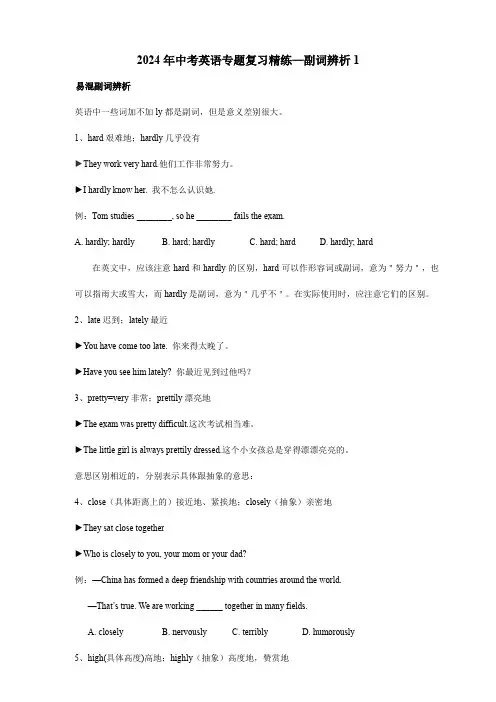
2024年中考英语专题复习精练—副词辨析1易混副词辨析英语中一些词加不加ly都是副词,但是意义差别很大。
1、hard艰难地;hardly几乎没有►They work very hard.他们工作非常努力。
►I hardly know her. 我不怎么认识她.例:Tom studies ________, so he ________ fails the exam.A. hardly; hardlyB. hard; hardlyC. hard; hardD. hardly; hard在英文中,应该注意hard和hardly的区别,hard可以作形容词或副词,意为"努力",也可以指雨大或雪大,而hardly是副词,意为"几乎不"。
在实际使用时,应注意它们的区别。
2、late迟到;lately最近►You have come too late. 你来得太晚了。
►Have you see him lately? 你最近见到过他吗?3、pretty=very非常;prettily漂亮地►The exam was pretty difficult.这次考试相当难。
►The little girl is always prettily dressed.这个小女孩总是穿得漂漂亮亮的。
意思区别相近的,分别表示具体跟抽象的意思:4、close(具体距离上的)接近地、紧挨地;closely(抽象)亲密地►They sat close together►Who is closely to you, your mom or your dad?例:—China has formed a deep friendship with countries around the world.—That’s true. We are working ______ together in many fields.A. closelyB. nervouslyC. terriblyD. humorously5、high(具体高度)高地;highly(抽象)高度地,赞赏地►The kites fly high in the sky. 这些风筝在天空飞得很高。
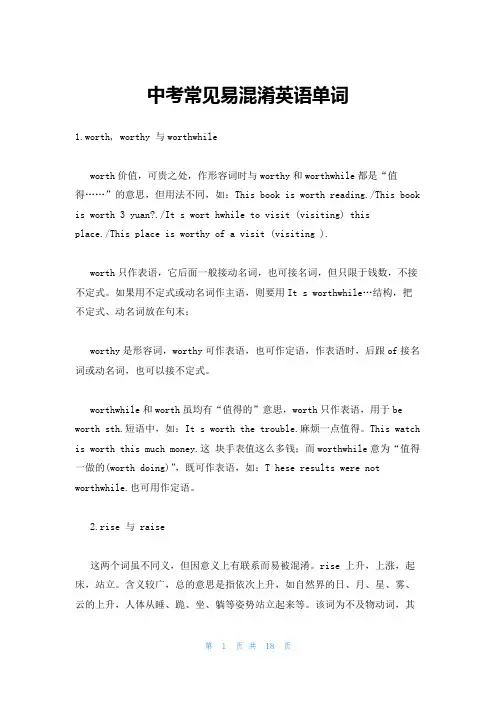
中考常见易混淆英语单词1.worth, worthy 与worthwhileworth价值,可贵之处,作形容词时与worthy和worthwhile都是“值得……”的意思,但用法不同,如:This book is worth reading./This book is worth 3 yuan?./It s wort hwhile to visit (visiting) thisplace./This place is worthy of a visit (visiting ).worth只作表语,它后面一般接动名词,也可接名词,但只限于钱数,不接不定式。
如果用不定式或动名词作主语,则要用It s worthwhile…结构,把不定式、动名词放在句末;worthy是形容词,worthy可作表语,也可作定语,作表语时,后跟of接名词或动名词,也可以接不定式。
worthwhile和worth虽均有“值得的”意思,worth只作表语,用于be worth sth.短语中,如:It s worth the trouble.麻烦一点值得。
This watch is worth this much money.这块手表值这么多钱;而worthwhile意为“值得一做的(worth doing)”,既可作表语,如:T hese results were not worthwhile.也可用作定语。
2.rise 与 raise这两个词虽不同义,但因意义上有联系而易被混淆。
rise 上升,上涨,起床,站立。
含义较广,总的意思是指依次上升,如自然界的日、月、星、雾、云的上升,人体从睡、跪、坐、躺等姿势站立起来等。
该词为不及物动词,其过去式与过去分词分别是rose 和 risen。
例如:The sun rises in the east and sets in the west.日出于东而落于西。
/ Prices rise every day in those countries.那些国家里的物价天天上涨。
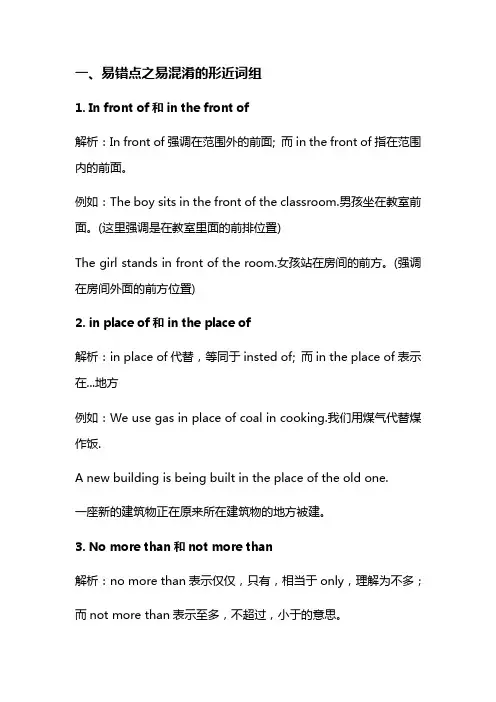
一、易错点之易混淆的形近词组1.In front of和in the front of解析:In front of强调在范围外的前面; 而in the front of指在范围内的前面。
例如:The boy sits in the front of the classroom.男孩坐在教室前面。
(这里强调是在教室里面的前排位置)The girl stands in front of the room.女孩站在房间的前方。
(强调在房间外面的前方位置)2.in place of和in the place of解析:in place of代替,等同于insted of; 而in the place of表示在...地方例如:We use gas in place of coal in cooking.我们用煤气代替煤作饭.A new building is being built in the place of the old one.一座新的建筑物正在原来所在建筑物的地方被建。
3.No more than和not more than解析:no more than表示仅仅,只有,相当于only,理解为不多;而not more than表示至多,不超过,小于的意思。
例如:He is no more than an ordinary English teacher. 他只不过是个普通的英文老师。
He has not more than three children. 他最多3 个孩子(有或许还不到三个)4.On earth和on the earth解析:两者都有在地上,在地球上的意思,但on earth还有到底,究竟的意思;On the earth只是单纯的表示在地上,在地球上例如:where on earth did you spring from?你究竟从哪里冒出来的?What if there was no lead on the earth at all?如果地球上根本就没有铅这种物质怎么办?5.At all和after all解析:at all表示根本,全然的意思,常用短语not at all表示一点也不;after all表示到底,毕竟的意思例如:I don't know him at all. 我根本不认识他。
中考易混淆单词词组汇总一、单词部分。
1. accept [əkˈsept] (v.) - 接受。
- 例句:I accept your invitation.(我接受你的邀请。
)2. except [ɪkˈsept] (prep.) - 除……之外。
- 例句:Everyone is here except Tom.(除了汤姆,大家都在这儿。
)3. alive [əˈlaɪv] (adj.) - 活着的,有生气的(作表语或后置定语)- 例句:The fish is still alive.(这条鱼还活着。
)4. living [ˈlɪvɪŋ] (adj.) - 活着的(可作表语和定语),n. 生活,生计。
- 例句:He is one of the greatest living writers.(他是在世的最伟大的作家之一。
)- 例句:make a living(谋生)5. alone [əˈləʊn] (adj. / adv.) - 单独的(地),独自的(地)(强调独自一人的状态)- 例句:He lives alone.(他独自生活。
)6. lonely [ˈləʊnli] (adj.) - 孤独的,寂寞的(带有感情色彩)- 例句:The old man feels lonely.(这位老人感到孤独。
)7. beside [bɪˈsaɪd] (prep.) - 在……旁边。
- 例句:Sit beside me.(坐在我旁边。
)8. besides [bɪˈsaɪdz] (prep. / adv.) - 除……之外(还有),此外。
- 例句:Besides English, we also learn French.(除了英语,我们还学法语。
)- 例句:I don't like this dress. Besides, it's too expensive.(我不喜欢这条裙子。
它太贵了。
初中必考20组必考英语易混词辨析——易混词辨析——1、accomplish vs. achieveaccomplish (v.): 完成某项任务。
例子: She accomplished her homework. (她完成了作业。
)achieve (v.): 实现目标。
例子: He achieved his goal. (他实现了他的目标。
)2、advice vs. adviseadvice (n.): 建议。
例子: I need your advice. (我需要你的建议。
)advise (v.): 提供建议。
例子: I advise you to study. (我建议你学习。
)3、allow vs. permitallow (v.): 允许,通常口语化。
例子: My parents allow me to go out. (我的父母允许我出去。
)permit (v.): 允许,通常正式。
例子: The school permits it. (学校允许这样做。
)4、bored vs. boringbored (adj.): 感到无聊的。
例子: I feel bored in class. (我在课堂上感到无聊。
)boring (adj.): 令人无聊的。
例子: The movie was boring. (这部电影很无聊。
)5、careful vs. cautiouscareful (adj.): 小心的。
例子: Be careful with that glass. (小心那只玻璃杯。
)cautious(adj.): 小心翼翼的,避免风险。
例子: He is cautious with money. (他在处理钱时很小心。
)6、common vs. ordinarycommon (adj.): 普遍的。
例子: It is common to use phones. (使用手机是很常见的。
中考易混词汇辨析1.few和little【辨析】few只能修饰复数可数名词,little 只能修饰不可数名词。
Few people can live well with little money.2.a few和a little【辨析】a few只能修饰复数可数名词,a little 只能修饰不可数名词。
I need a little time to do a few things.3.a lot和a lot of【辨析】a lot只用作副词,相当于very much;a lot of 则用作定语修饰名词。
You’ve given me a lot of help. Thanks a lot.4.able和capable【辨析】able常以be able to do sth. 的形式出现,表示“有能力做某事”。
capable常以be capable of doing sth. 的形式出现。
He is able to speak three foreign languages.I am sure he is capable of doing the job well.5.accept和receive【辨析】accept表示主观上接受某物,receive表示客观上收到某物。
Jane __accepted______ a gift from Jim, but she didn’t __receive______ it.6.across和through【辨析】across指从物体的表面经过;through指从物体的内部或空间穿过。
He swam across a river and walked through a forest before he got to the village.7.ago和before【辨析】ago只作副词,不能单独使用,必须与表示时间的词连用,用于从现在算起的某段时间之前,常与一般过去时连用。
初中英语易混词汇辨析1.clothes,cloth,clothingclothes统指各种衣服,谓语动词永远是复数cloth指布,为不可数名词clothing服装的总称,指一件衣服用a piece of,an article of2.incident,accidentincident指小事件,accident指不幸的事故He was killed in the accident.3.amount,numberamount后接不可数名词,number后接可数名词a number of students4.sound,voice,noisesound自然界各种各样的声音,voice人的嗓音,noise噪音I hate the loud noise outside.5.photo,picture,drawingphoto用照相机拍摄的照片,picture可指相片,图片,电影片,drawing画的画Let's go and see a good picture.6.weather,climateweather一天内具体的天气状况,climate长期的气候状况The climate here is not good for you.7.road,street,path,wayroad具体的公路,马路,street街道,path小路,小径,way道路,途径take this road;in the street,show me第1/16页the way to the museum.8.course,subjectcourse课程(可包括多门科目),subject科目(具体的学科)a summer course9.custom,habitcustom传统风俗,习俗,也可指生活习惯,后接to do,habit生活习惯,习惯成自然,后接of doing.I've got the habit of drinking a lot. 10.cause,reasoncause指造成某一事实或现象的直接原因,后接of sth./doing sth,reason用来解释某种现象或结果的理由,后接for sth./doing sth.the reason for being late11.exercise,exercises,practice exercise运动,锻炼(不可数),exercises练习(可数),practice(反复做的)练习Practice makes perfect.12.class,lesson作"课"解时,两者可以替换.指课文用lesson.指班级或全体学生用class.lesson6;class513.speech,talk,lecturespeech指在公共场所所做的经过准备的较正式的演说,talk日常生活中的一般的谈话,讲话,lecture学术性的演讲,讲课a series of lecture on…14.work,job二者均指工作。
九年级常考的易混淆词汇,短语及句型辨析汇总(一)1. by,with与in的辨析:(1)介词by:① by +doing sth. 用于回答how引导的疑问句;e.g. How can I learn English well?By reading every morning.②by+交通工具,“乘/坐……”;e.g. by busby air③by+地点,“在……的旁边;靠近……”;e.g. by the lakeby the hill④by+时间,“截止到……; 不迟于……”;e.g. by tenby midnight⑤“被”;e.g. The house was destroyed by fire.Tom was praised by his English teacher yesterday.⑥“沿着,经由”。
e.g. We enter the company by the doorHis grandfather likes going for a walk by the river after dinner,⑦常用的短语:by the way 顺便问一下by accident= by chance 偶然地by mistake 错误地one by one 一个接一个step by step 一步一步地little by little 逐渐地by the time 到……为止by oneself 独自地shake sb. by the hand 和某人握手(2)with的用法:表示用某种工具。
with +工具;with+人体部位。
e.g. We like to write with a pen.We see with our eyes.(3) in的用法:通常与“语言、衣着、声音、书写材料”等名称连用。
e.g. in English用英语in ink用墨水speak in a loud voice大声地讲in red 穿红色的衣服2. so/ such…that… 的用法辨析:(1)“如此……以至于……”,引导的结果状语从句句型有:①so +形容词/副词+that 从句;②so+形容词+ a / an +单数名词+that 从句;③such+ a / an + (形容词)+单数名词+that 从句;④such +(形容词)+复数名词/ 不可数名词+ that从句。
学习-----好资料
更多精品文档中考英语易混词汇辨析
above/over/on
词汇用法例句
above “在……上方”,不一定含有垂直在上的意
思。
反义词为:below
The sun rose a bove the horizon.
太阳升到了地平线以上。
over “在……上面”,含有垂直在上的意思There is a bridge o ver the river. 河上有座桥。
on“在……上面”,含有与表面相接触的意思There is an oil painting on the wall. 墙上有一幅油画。
across/through
词汇用法例句
across “横过,穿过”,指从……的
一边到另一边
Be careful when you walk across the road.
当你过马路的时候要小心。
through“穿过”,强调从内部穿过The river flows through the city from west to east. 这条河从西到东流过城市。
at all/ after all
词汇用法例句
at all “全然,根本不”,一般用于否定句
中加强语气
She doesn’t like football
at all.
她一点也不喜欢足球。
after all “毕竟,终究,到底”,一般置于句
首或句末作状语
After all, he is a child.毕竟,他还是个孩子。
few / a few / little / a little
词汇含义修饰名词肯定/否定例句
few 几乎没
有
可数
否定
I am a new comer here, so I have few friends here.
我刚来到这里,所以我在这里没有几个朋友。
a few 有一些肯定Though the man has been here for only one month, he has a few friends.
尽管这个人才在这里住了一个月,但他就有了一
些朋友。